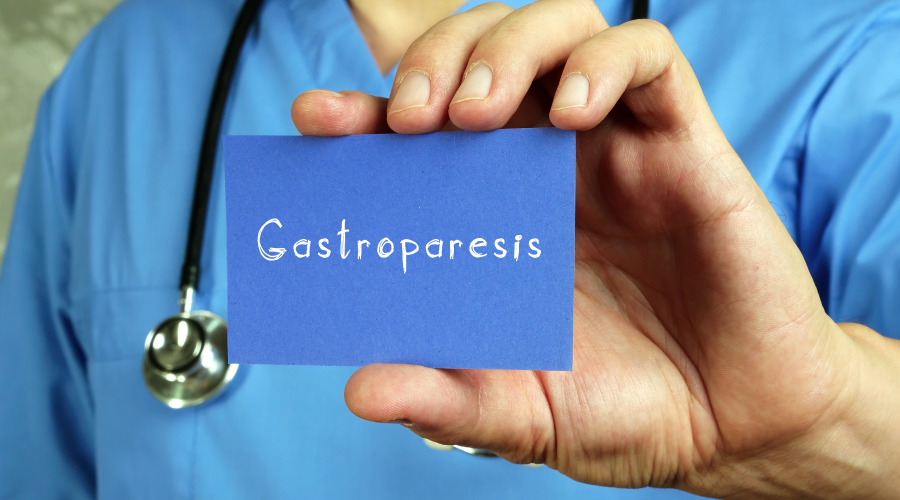

Gastroparesis disease is typically characterised by the stomach’s inability to clear itself normally. The condition can be disturbing and stressful with lingering symptoms like nausea, vomiting, bloating, and heartburn. Also, the dietary intake takes a dip as the patient starts feeling full too quickly upon eating. Medically, a gastroparesis treatment plan revolves around medications and surgery. But a few dietary changes have proven to be an effective gastroparesis cure. But before we walk you through the ways to treat Gastroparesis, let us first understand what leads to this condition.
What Causes Gastroparesis?
Gastroparesis is caused when the nerves and muscles fail to function with their normal strength. The Vagus nerve, the one responsible for managing the complex processes in the digestive tract, plays the most important role in controlling the activity of the stomach muscles. Due to impaired coordination between the vagus nerve and the muscles, the movement of food slows down in the digestive tract, causing gastroparesis.
While long-drawn diabetes is primarily responsible for the weakening of the vagus nerve, other causes of gastroparesis include:
- Acute viral infection
- Abdominal or gastric surgery causing injury to the vagus nerve
- Narcotics and drugs
- Chronic antidepressant use
- Amyloidosis, accumulation of protein fibres in tissues and organs
- Scleroderma, a connective tissue disorder
- Nervous disorders like Parkinson’s disease
- Hypothyroidism or underactive thyroid
Early Symptoms of Gastroparesis
The problem is more likely to affect women than men. Also, while it typically affects young to middle-aged women, it may also affect younger girls. The early signs of gastroparesis include:
- Feeling full too soon upon eating
- Remaining full for a considerably long period of time
- Nausea
- Vomiting
- Stomach bloating
- Excessive belching
- Pain in the upper abdomen
- Heartburn
- Loss of appetite or poor appetite
- Can cause dehydration and malnutrition which could present as
- Pale skin
- Dark-coloured urine
- Fatigue
- Urinating less than usual
- Light-headedness
- Feeling dizzy
Complications of Gastroparesis
Although gastroparesis is not a life-threatening disease, its side-effects and overall impact on the body can give rise to serious complications. These include:
- Dehydration – Patients who throw up too often run a risk of severe dehydration.
- Undernourishment – As Gastroparesis patients tend to feel full too quickly, the appetite intake reduces, leading to lesser calorie and nutrient intake. Also, ongoing vomits can further reduce the absorption of nutrients.
- Formation of Bezoar – Solid mass of undigested food which hardens and stays in the stomach is called a bezoar. The presence of bezoars triggers nausea and vomiting. The condition may turn life-threatening if they block the food from passing into the small intestine.
- Erratic blood sugar variations – The unregulated movement of food in the small bowel from the stomach spurs erratic changes in blood sugar levels. This is a vicious cycle as frequent blood sugar changes make diabetes worse and poor management of blood sugar levels, in turn, worsens gastroparesis.
- Poor quality of life – Unsettling gastroparesis symptoms interfere with routine tasks, reducing the quality of life significantly.
Diagnosis of Gastroparesis
Meeting a health care professional for the diagnosis of gastroparesis is important. In addition to your ongoing symptoms, medical history, and physical examination, a few blood tests along with diagnostic investigations will be done to help diagnose gastroparesis. The tests may include:
- Gastric emptying tests like Scintigraphy and breath tests
- Upper gastrointestinal endoscopy
- Ultrasound
- SmartPill test
Gastroparesis Treatment
Gastroparesis is a chronic condition. While there is no gastroparesis cure, the gastroparesis treatment simply focuses on managing the symptoms and keeping them under control. Diabetic gastroparesis treatment concentrates on keeping the blood glucose levels in control. The overall gastroparesis treatment plan includes:
Medications
Medications used for gastroparesis treatment work in two parts. One category of drugs helps stimulate muscle activity while the other category helps keep vomiting and nausea symptoms under control.
- Muscle stimulators like metoclopramide and erythromycin promote the activity of the stomach muscles. But these drugs have serious side effects and may lose effectiveness over time.
- Medications like diphenhydramine, ondansetron, and Prochlorperazine help to ease nausea and vomiting symptoms.
Surgical Intervention
As the gastroparesis condition gets severe and long-drawn, some people may require surgical intervention to ease the side effects. This primarily includes placing the feeding tube, medically known as the jejunostomy tube, in the small intestine. In some cases, a venting gastrostomy is performed and a tube is placed that helps relieve pressure from gastric contents may prove helpful. While temporary feeding tubes are inserted through the nose or mouth, in severe cases IV parenteral nutrition is given if other treatments are not working.
Patients may also benefit from electrical gastric stimulation wherein electrodes are attached to the stomach through a surgical procedure that triggers stomach contractions.
Gastroparesis Treatment Through Lifestyle Changes
Bringing about changes in the diet is the easiest way to manage early symptoms of gastroparesis. Ideally, you should consult your doctor and work mutually to incorporate the foods and change in eating habits that can help sail through the condition comfortably. Changes in eating and lifestyle habits include:
- Eating smaller meals more frequently
- Chewing food properly
- Eating well-cooked fruits and vegetables
- Avoiding raw fruits and vegetables
- Avoiding fibrous fruits and vegetables
- Prefer eating low-fat foods
- Taking soups and pureed vegetables as they are easy to swallow and digest
- Drinking lots of liquid, at least 1.5 litres of water every day
- Gently exercising after each meal [take a walk] aids in digestion
- Avoiding intake of carbonated drinks
- Quitting alcohol and smoking
- Do not lay down for at least two hours post-meal
- Taking multivitamin supplements daily to avoid micronutrient deficiency
- Adding starches in the form of white bread, pasta, rice, rice cereals, and puffed wheat.
- Taking adequate quantities of proteins like tofu, cottage cheese, lean beef, chicken, and dairy products.
- Eating a wholesome diet which includes lots of fruits and vegetables.
Home Remedies for Gastroparesis Treatment
The gastroparesis treatment at home is meant to alleviate symptoms primarily related to acid reflux. The below-mentioned home remedies can prove to help do the same.
- Add 3-4 teaspoons of apple cider vinegar to around 250 ml of lukewarm water. You may also add honey to suppress the bitter taste. Try taking it before a meal or when feeling heartburn.
- Add a teaspoon of baking soda to about 250 ml of water. The mix has an Alka-seltzer effect and helps neutralise the excess acid in the stomach.
- Taking Aloe vera, the wonder herb, in the form of juice or tablets heals the gastrointestinal tract. It also improves digestion and absorption of foods.
- Taking liquorice root in powdered form helps soothe the abrasions in the esophageal lining. Try taking it regularly before meals.
- Drinking barley grass juice which contains high quantities of chlorophyll and amino acids helps ease the gastrointestinal lining with its anti-inflammatory properties.
- Taking Aloe vera, the wonder herb, in the form of juice or tablets heals the gastrointestinal tract. It also improves digestion and absorption of foods.
- Taking cabbage juice as it is known to contain high amounts of glutamine that soothes the gastrointestinal tract.
- Slippery elm, a herb that confers a soothing effect to the tissues around the oesophagus and thus protects the gastrointestinal tract.
Conclusion
Many people with gastroparesis will not have noticeable symptoms on the onset of the disease. In some cases, the condition may be fleeting and will settle on its own. But in others, it may progress gradually and can affect the quality of life drastically. Thankfully, a well-managed gastroparesis treatment plan can help people tackle the problem comfortably.





I was just dx last month with GP and am trying to find natural ways to heal my gut.
Thank you for the article.
Debbie